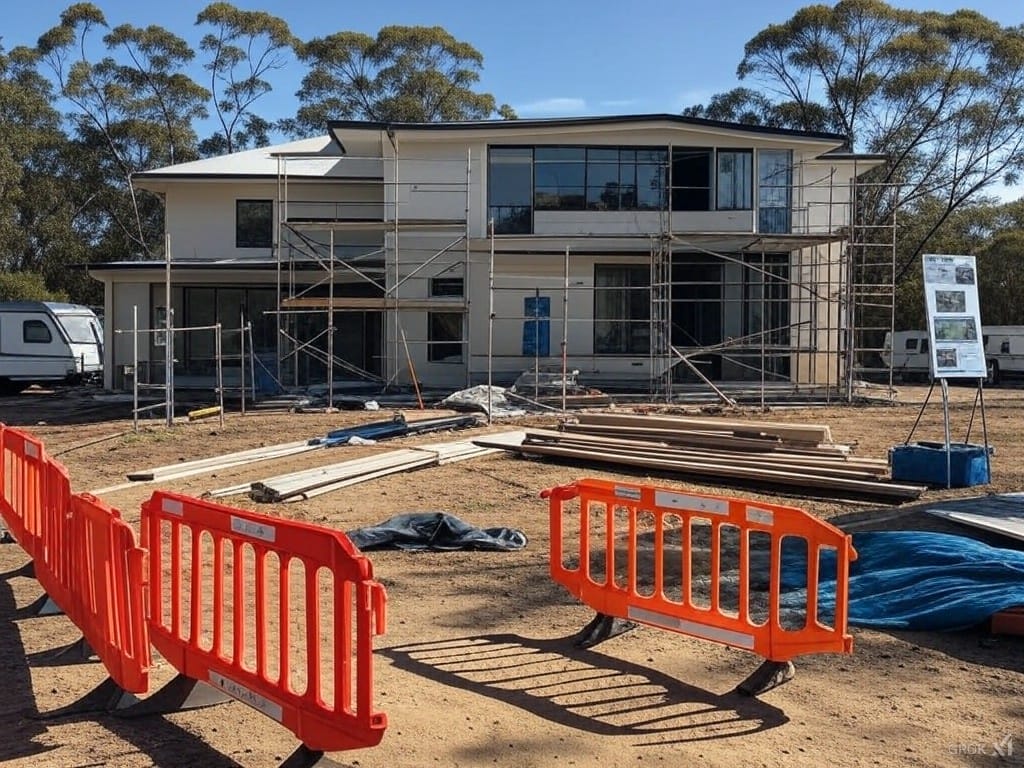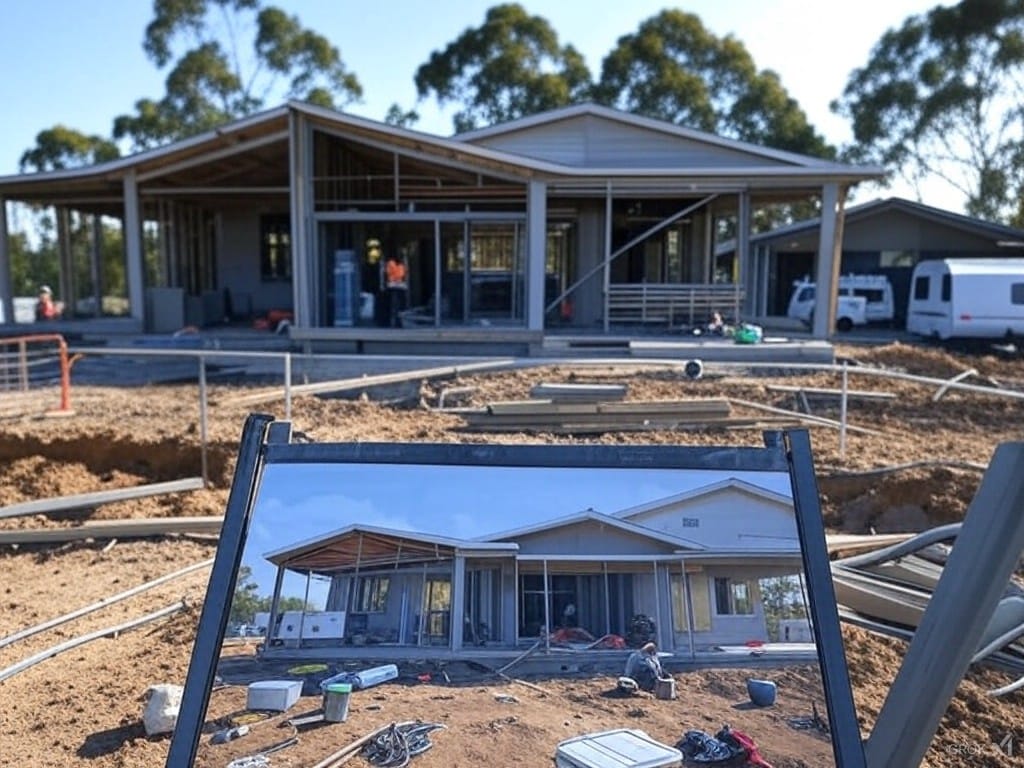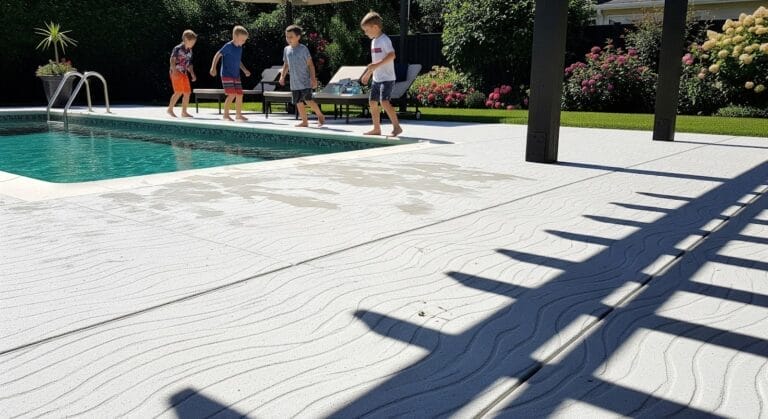Can You Stay in Your Home During a Knock Down Rebuild?
The vast Australian outback, where the very dream of owning a plot and building your perfect home is firmly entrenched in its culture. It brings to a person’s mind the idea of a knock-down rebuild. The most common questions arise, though: Can you stay in your home while all the construction chaos unfolds around you? Let us dwell on this subject and give an all-encompassing view of the feasibility, safety, and practicality of living through a knock-down rebuild.
The Safety Dilemma

If living in your house during your knock-down rebuild were possible, then the major concern would be safety. Just imagine a place that was the sanctuary for peace and which now has become a battlefield with all the noise from the movements of bulldozers and builders. Major hazards are posed by the physical demolition itself, including falling debris, flying dust, and constant movement of heavy machinery. These elements would then make it not just uncomfortable but outright unsafe to stay in your residence.
Even if you’re not directly in the path of demolition, the structural integrity of any remaining parts of the house could be called into question. Electrical wires might be exposed, walls could become unstable—and the risk of injury from unexpected collapses or building materials is high. Contractors will often recommend that you vacate the premises to avoid these hazards, and for good reason. Insurance policies also often stipulate that no one should be living in the construction zone for safety and liability reasons.
The Comfort Factor
And now, about comfort—about which there is almost none in such a scenario. There’s often no respite from the din of construction noise, starting early in the morning and finishing late at night and often accompanied by associated dust finding its way into every nook and cranny. Can you cook in a part-demolished kitchen or relax when those construction noises are constantly hammering in the background?
Of course, basic amenities like plumbing, electricity, and water supply might be either intermittent or completely unavailable during the various phases of construction. You could be left without the use of a bathroom or kitchen for weeks on end. These disturbing situations and disruptions to the daily schedule might make what should be an exciting project feel like a stressful ordeal.
Space and Privacy
Would one have space? If your home is undergoing reconstruction, what is one supposed to do? Those lucky enough to have a large property can think about assembling some form of temporary living, be it a granny flat, a caravan, or a tent. But even in that, there’s the issue of privacy and space. Construction knows no boundaries; workers will have to move around different parts of the property, where they may well intrude into your makeshift living quarters.
Also, the sense of privacy that one may have felt in one’s home will be lost. Thus, builders Melbourne, inspectors, and all kinds of professionals will be constantly coming and going, turning your home into some kind of public thoroughfare rather than a place of private retreat. If at all, the only privacy you may imagine valuing is this, then this reason alone could destroy any thought of living on-site during the rebuild as one of the possible choices.
Regulatory Hurdles
However, there are the regulations. In Australia, local councils have very specific laws as to how one can go about living in the home while building work is being done. This opens up a maze of permits and other council regulations when setting up a caravan or alternative temporary structure. Some councils do not allow such installations, others have extremely difficult conditions around the issues of sanitation, safety, or location on your property.
Even if permission was given, this could be very time-consuming and result in planning changes to meet all the regulations—such as setting up temporary utilities and solid waste disposal, good health and safety conditions regarding your living quarters, etc. All these bureaucratic hoops will only serve to make a really big project more stressful and complicated.
Practical Solutions
That being said, practical advice is typically for one to find somewhere else to stay while the rebuild is happening. This could mean renting a property close to the construction, relocating in with family, or going on holiday should the project allow. It adds to the cost, and it is an inconvenience, but at the same time comes with corresponding benefits in terms of peace of mind safety, and comfort.
In case one has to stay near the worksite:
Shorter-Term Rentals: Investigate short-term rental options in your area; they may be much more flexible than one’s currently long lease.
Staff Quarters and Other In-House Arrangements: When one does have a staff quarter or can easily build one, this could very well be used as temporary accommodation, but then of course, only when this would not violate local building regulations.
Stay with Friends and Relatives: While this might save money and, in some cases, enhance the bonds within the family, it also introduces another set of dynamics that must be managed.
The Emotional Aspect
There is also an emotional issue. Because after all, home isn’t exactly bricks and mortar; it’s the site of memories, and life unfolding—and to see it being torn down can be very, very emotionally exhausting. This period could, therefore, actually offer a bit of emotional distance in helping you deal with the transformation.
However, if you think staying within the vicinity might help, you can watch the process unfold in front and maybe make a little bit of last-minute changes. That way, you may also build your own house, not only in the physical sense but also as a community project with yourself working in partnership with your builder.
Final Thoughts
The temptation to knock down and rebuild while staying might be considered for the sake of continuity and funds, but several reasons make it a huge challenge. On the flip side, safety, comfort, privacy, regulatory compliance, and emotional health all tip the scales toward finding an abode outside the construction site. The process of literally rebuilding a home is not just massive in terms of physicality but also due to the changed life it brings. An open mind, practical planning, and maybe a bit of adventure during this transitioning phase, are sure to turn this into a memorable positive journey rather than a stressful ordeal. Irrespective of whether you decide to stay close or take some time away, the objective is to have a beautiful new home that will make a perfect fit for your life. Keep in mind, that sometimes it’s good to step back so you can get a better view of a new beginning that awaits you.







